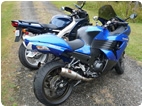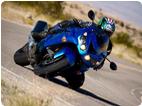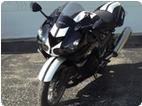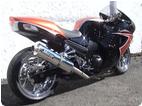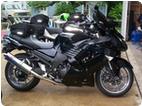Don't make it difficult by trying to attach the physics concepts to riding emotions. Its really pretty straight forward.
Work done is the product of applied force and distance moved along the line of the force applied. Or in algebraic notation: W = fs where W is work and f is force and s is distance.
Power is the time rate (speed) of doing work. Or: P = W/t where P is power and W is work done and t is the time it took to do the work.
Now by algebraic substitution: P = Fs/t
but velocity (speed of movement) is equal to distance moved divided by the time it took to move that distance.
Or: v = s/t.
Subbing again: P = fv where P is power and f is force and v is velocity. Power delivered to the pavement (or the dyno) is the force of the tire against the (road) surface times the velocity of your Ninjee; assuming no tire slip.
Finally, what if the motion is rotary? Then the force is delivered to the end of a radial arm or the surface of a "wheel" and the distance moved is the circumference of the wheel or circle turned. Work then is still equal to fs; but s is the distance moved around (and around) the circle at its outer edge. That total distance is the number of circles turned times the circumference of the circle. s = N(2 pi r), where s is total distance and r is the radius of the circle or the length of the radial arm (lever arm). (2 pi r) is therefore the circumference of the circle turned. N is the number of circles turned.
Work is now equal to the product of force and radius and 2 pi and N. Power is still equal to the work done divided by the time it took to do it or: P = W/t = fN(2 pi r)/t.
OR, by substitution and regrouping: P = fr N(2 pi)/t
Now fr is the force (applied at the circumference) times the length of the radial arm (radius of circle) or the torque produced to cause rotary motion and....
N(2 pi) is the number of revolutions through a full circle (an angle of 2 pi radians or 360 degrees) and...
t is still the time it takes to complete the movement. Therefore, N(2 pi)/t = w or rotational velocity.
VIOLA! Power is equal to torque times rotational velocity (revolutions per minute, radians per second, etc.) or
P = Tw where T is torque and w is rotary velocity and P is still power being produced at the contact surface. Your number 5252 is just a correction for unit conversions between feet, lbs, minutes, and horsepower.
In the rpm range where the torque curve is "flat" then the horsepower will be directly proportional to the rpm. Torque is relatively constant and as rpm increases so will hp. Double the rpm and the hp would double. But torque curves are not always flat are they? Where torque and rpm are both increasing, hp will be rising precipitously; but where torque is dropping off even as rpm continues to climb, hp may level off or even decline.
In short, if maximum torque doesn't occur where rpm is maximum then maximum hp will not be the product of maximum torque and maximum rpm. Hp will be, quite possibly, considerably less than could be generated under that false assumption and simplistic calculation.
The dyno will tell you where torque is max and where hp is max, as you know. The rpm at which those maximums occur may be quite different. Numerous characteristics of the engine's mechanical construction and fuel chemistry and exhaust/intake function, etc will determine where the peaks occur and their quantification.
Hope this is helpful.
* Last updated by: PaulAB on 3/11/2013 @ 10:36 PM *
Nothing is more responsible for the good old days than a bad memory. (Franklin Pierce Adams)
